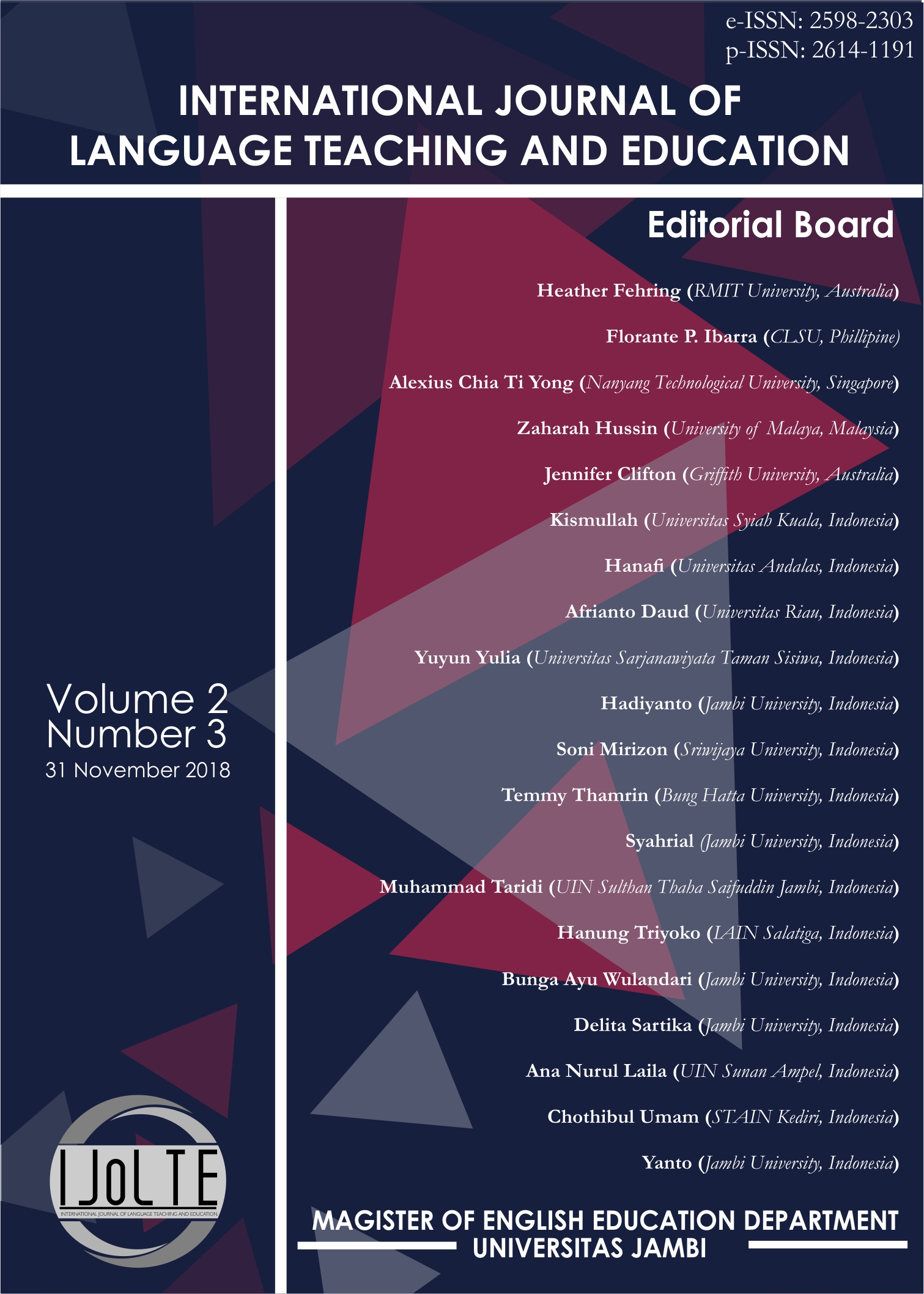Attitude of Hausa ESL Secondary School Students Towards Spelling and Writing in English
DOI:
https://doi.org/10.22437/ijolte.v2i3.5908Abstract
Writing skill is described as an essential language tool for students. Studies have shown that Hausa ESL secondary school students commit various errors in their writing in English. Various factors have been identified as responsible for the problems. However, the students’ attitude towards spelling and writing has not been investigated. It is believed that students’ attitude plays an important role in motivating and influencing their second-language learning. Therefore, the aim of this study is to explore the attitude and perception of Hausa ESL secondary school students towards English spelling and writing. The study adopts a survey research design where an intact class of 75 students from a secondary school in north-eastern Nigeria was selected. To collect the data for the study, a questionnaire was employed. The questionnaire comprises two sections: (i) attitudes toward English spelling and (ii) attitudes toward writing in English which include four writing purposes: (a) School Use, (b) Social Use, (c) Official Use, and (d) Creativity. Findings of the study revealed that the participants have a moderate positive attitude and perception towards English spelling and writing. The findings also indicated that the students’ attitude toward the School Use of English is the highest, whereas their Creativity in writing has the lowest means among the four purposes. In addition, the study revealed that there is a significant positive relationship between the participants’ attitude towards spelling and writing. To enhance students’ creative writing and thinking skills, the study suggests that literature in English should be made compulsory to all secondary school students. Story-reading and creative writing should be incorporated into the curriculum. Other extracurricular activities such as spelling completion should be organised to help the students.
Downloads
Downloads
Published
Versions
- 2018-12-01 (1)
- 2018-12-01 (1)
How to Cite
Issue
Section
License
The Authors submitting a manuscript do so on the understanding that if accepted for publication, copyright of the article shall be assigned to International Journal of Language Teaching and Education (IJoLTe) and Magister Program of English Education Department, Universitas Jambi as publisher of the journal. Copyright encompasses rights to reproduce and deliver the article in all form and media, including reprints, photographs, microfilms, and any other similar reproductions, as well as translations.
IJoLTe keep the rights to articles that have been published. And, the authors are permitted to disseminate published article by sharing the link of IJoLTe' website. Authors are allowed to use their works for any purposes deemed necessary without written permission from IJoLTe with an acknowledgement of initial publication in this journal.
IJoLTe and Magister Program of English Education Department, Universitas Jambi, and the Editors make every effort to ensure that no wrong or misleading data, opinions or statements be published in the journal. In any way, the contents of the articles and advertisements published in IJoLTe are the sole and responsibility of their respective authors and advertisers.
If the article was jointly prepared by more than one author, any authors who submitting the manuscript warrants that he/she has been authorized by all co-authors to be agreed on this copyright and license notice (agreement) on their behalf, and agrees to inform his/her co-authors of the terms of this policy. IJoLTe will not be held liable for anything that may arise due to the author(s) internal dispute. IJoLTe will only communicate with the corresponding author.
By submitting the article/manuscript to this journal, the authors agree with this policy and consciously agree that IJoLTe does not provide royalties or other fees to the authors for their published articles. By agreeing this policy, IJoLTe ensures that published articles are publicly accessible and will be free of charge for the readers. No specific document sign-off is required.
Users of this website will be licensed to use materials from this website following the Creative Commons Attribution 4.0 International License. Please use the materials accordingly
You are free to:
- Share — copy and redistribute the material in any medium or format
- Adapt — remix, transform, and build upon the material for any purpose, even commercially.
- The licensor cannot revoke these freedoms as long as you follow the license terms.





